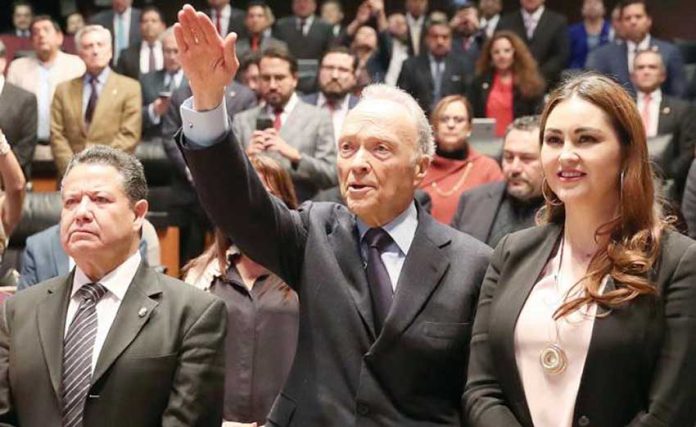The Senate has elected an ally of President López Obrador to a nine-year term as Mexico’s new top prosecutor, triggering criticism that the office he heads will not be independent and impartial.
An overwhelming majority of members of the Senate, which is controlled by a coalition led by the president’s Morena party, voted yesterday for veteran lawman Alejandro Gertz Manero to be fiscal general, a new position that replaces the role of attorney general.
Gertz, a former federal secretary of public security who was a security advisor to López Obrador during last year’s presidential campaign, had been serving as acting attorney general since the new government took office on December 1.
He received 91 votes to beat two other candidates proposed by López Obrador.
Speaking in the Senate after he was sworn in, the 79-year-old lawyer and law professor pledged to build a new prosecutor’s office which defends citizens’ rights and leaves behind the practice of concealing evidence.
He said that prosecuting corruption cases that haven’t been properly investigated will be a priority for the new office.
“All of the pending cases are going to be pursued to their legal conclusion . . . There mustn’t be any more concealments or cover-ups,” he said.
Gertz committed himself to heading up a prosecutor’s office – known as the Fiscalía General de la Republica, or FGR – that “makes the truth known and [acts] in good faith, with clarity and above all with the participation of the victims and the offended parties.”
In an appearance before senators earlier this week, he pledged to be transparent and accountable in the role and noted that “in a country where there are 33 million crimes committed a year and 99% go unpunished, we have a lot to do.”
Before yesterday’s vote, Damián Zepeda Vidales, a senator for the opposition National Action Party (PAN), urged senators not to vote for any of the candidates, charging that due to their proximity to the president, whoever was elected would be a “fiscal carnal” – a government-friendly prosecutor.
“It doesn’t offend anyone to say that [the candidates for the role] are members of the legal and political team of Andrés Manuel López Obrador, who clearly sees the Fiscalía General as a branch of government,” he said.
But Morena party Senator Julio Menchaca Salazar said that appointment to the fiscal general role was not “a blank check,” arguing that government lawmakers will be the foremost critics of the FGR.
Outside Congress, the president of the Mexican Employers Federation (Coparmex) also contended that Gertz will be a fiscal carnal.
“We hold that it’s necessary to modify the appointment process for the fiscal general because the way it was agreed on . . . doesn’t in any way guarantee the independence of the fiscal general. The autonomy of the prosecutor’s office is not guaranteed, on the contrary it has been created [as an institution that is] flawed from the beginning, [he’s a] fiscal carnal that will always defend the executive,” Gustavo de Hoyos warned.
“The name of the institution has changed but it remains an arm of the executive,” he contended.
De Hoyos said that all three candidates on the short list for the role were “very close to the president,” adding that when there has been a close relationship between presidents and top prosecutors in the past, there have been prosecutions on request, “comical” pardons, cases of impunity for politicians and persecution of candidates over crimes they allegedly committed.
Public policy think tank México Evalúa said in a statement that the appointment of Gertz showed that “priority was given to closeness, and the use of practices that don’t contribute to the transformation of the country that we deserve.”
The fiscal general role was created during the previous government in a bid to strengthen Mexico’s justice system but until now no appointment to the position had been made.
Source: El Universal (sp), Reuters (en)
